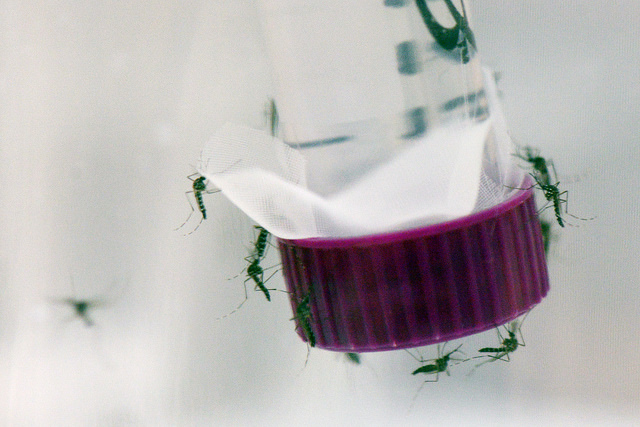Maytinee Kramer/Staff Writer
Eleven people in Florida were found to have been infected by the Zika virus after being bitten by local mosquitoes, bringing the total number of locally affected people in Florida to 15. In response, the Centers for Disease Control and Prevention issued an unprecedented travel warning, advising locals and tourists alike not to travel to Wynwood, the small community just north of downtown Miami.
According to agency spokesperson Tom Skinner who spoke to CNN, this is the first time the CDC has warned people not to travel to an American neighborhood.
Since the rapid spread throughout the Caribbean and Latin America, Zika’s arrival in the continental United States has been anticipated since last fall.
The nation’s first cluster of local infections emerged in July within a one-square-mile radius of Wynwood where two people were bitten. Another two in Broward also became infected after being bitten by local mosquitoes.
Florida Gov. Rick Scott previously announced that “Florida has become the first state in the nation to have local transmission of the Zika virus,” triggering a wave of response from public health agencies and elected officials.
The new cases of Zika were found by door-to-door surveys of 200 people in their homes and businesses, identified by urine and blood samples that tested positive for the virus or an antibody.
“New test measurements over the weekend showed a risk of continued active transmission in that area. Because of this finding, we are advising pregnant women not to travel to that area, and if they have traveled there on or after June 15, to visit their healthcare provider for testing,” said CDC Director Dr. Tom Frieden to CNN.
It is estimated that July 15 is the earliest day mosquitoes could have passed the virus. Local health officials think the virus was caught by biting a person who had returned to the United States with the disease, but because they showed no symptoms, “person zero” had no idea they were infectious.
“With 40 million travelers to and from areas where Zika is actively circulating, many can come back who feel perfectly fine,” Frieden said.
To help control the situation, the Florida governor asked the CDC for assistance in the Department of Health’s “investigation, research and sample collection efforts.”
“Their team will consist of public health experts whose role is to augment our response efforts to confirmed local transmissions of the Zika virus,” Scott said.
CDC personnel are already on the ground in Florida and their first task will be to understand why the local mosquito control efforts failed.
“In Miami, aggressive control measures are not working as well as we would like,” Frieden said. “The mosquitoes could be resistant to the pesticides being used, or the mosquitoes could be hiding in what we call ‘cryptic’ breeding places that are hard to find, like very small amounts of water where they can hatch.”
Ground testing could take several weeks and people living in the area or traveling to and from it are advised to take the necessary precautions to ensure safety and prevention of any more of the virus’ spread. Some precautions include applying insect repellent containing 25% DEET to uncovered skin, wearing thick long-sleeved shirts and long pants and removing standing water, a place where mosquitoes often lay eggs.
The CDC recommends additional precautions with the Miami outbreak: pregnant women who live in or travel to the area should get tested in the first and second trimesters of pregnancy, even if they have no symptoms of the virus; men and women should prevent mosquito bites and use proper protection during sexual activities or abstain from sex altogether; couples who have traveled to the affected area should wait eight weeks to conceive, while men with symptoms should wait six months.
U.S. health officials do not expect the Zika outbreak to be as widespread as it has been in Central and South America and the Caribbean. The reason is largely due to living conditions since most people in the U.S. have mosquito-control efforts and regularly use air conditioning. Furthermore, the vast majority of cases of Zika in the United States have been from travel to other countries where the virus is actively circulating.
In light of the 2016 Summer Olympics currently taking place in Rio de Janeiro, Brazil, travelers, athletes, attendees and locals alike are advised to follow the CDC’s recommendations to stay healthy and safe.
Brazil is one of the many destinations in the Americas experiencing an outbreak of the Zika virus, and because 80 percent of cases have no symptoms, people should take the necessary precautions. In addition, attendees to the Olympics are recommended to take extra effort to minimize their exposure to mosquito bites for two weeks after returning home, whether or not they are experiencing symptoms.
The health and safety of the FIU community is a top priority, so FIU has also been monitoring the situation proactively. Since the identification of the first Zika cases in South Florida, FIU has been working with local authorities and frequently following updates from the Florida Health Department and CDC. Currently, the university is not aware of any member of the university community being personally impacted by the Zika virus.
The World Health Organization may describe the Zika virus as a “public health emergency of international concern,” but that doesn’t mean we should panic. While it is true that the virus is already here in the States, Zika is manageable as long as we are prepared and remain clear-eyed.
Our world is too interconnected, travel is easier and mosquitoes are too airborne, so it’ll be impossible to keep this issue completely at bay. However, our public health system is sophisticated and capable of monitoring potential outbreaks and delivering medical services when necessary.
Here at home, we need to focus on minimizing risks to citizens and most importantly, avoiding panic. Nothing is certain, but the best way to prevent any further spread of the Zika virus is to be properly educated on the subject while taking the necessary precautions to ensure safety and prevent any possible spreading of the virus.
DISCLAIMER:
The opinions presented within this page do not represent the views of FIU Student Media Editorial Board. These views are separate from editorials and reflect individual perspectives of contributing writers and/or members of the University community.
Image retrieved from Flickr.






Be the first to comment on "Zika virus continues to spread in Miami"